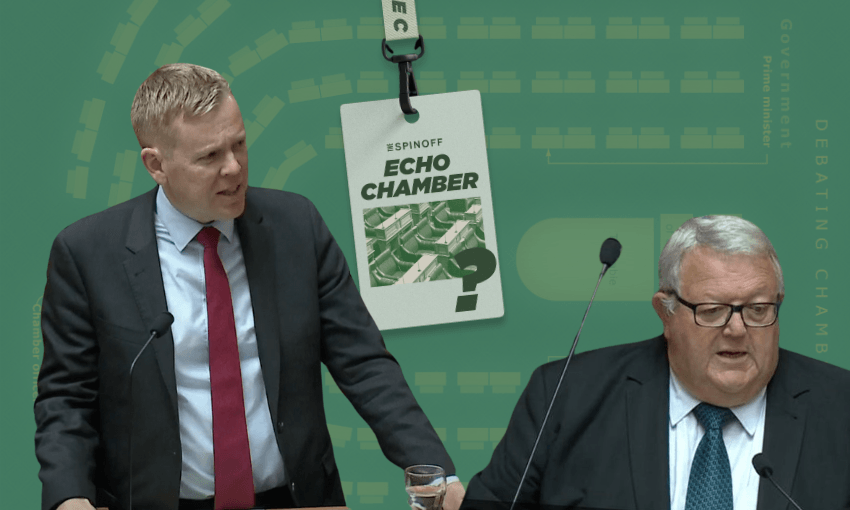Parliament is preoccupied with pointless points of order, and speaker Gerry Brownlee is absolutely done with it.
Here’s what happened in question time yesterday: Chris Hipkins asked Chris Luxon a bunch of questions about something bad his government had done. Luxon got flustered because he struggles to give an answer deeper than a bumper sticker slogan, so he reverted to a stump speech about Labour bad. Hipkins pulled a phoney indignant outrage routine and whined to speaker Gerry Brownlee that the prime minister was being mean and not answering his questions. Brownlee sighed and harumphed and generally gave the impression that he hated everyone, but ultimately didn’t do anything.
I wrote that opening paragraph before question time started because it happens every. single. time.
On Wednesday, the Labour leader focused on the prime minister’s recent complaints that the media wasn’t lauding him with praise for his government’s action to reduce the number of people in emergency housing. Hipkins pulled some statistics showing that the number of people living on the street had increased, which he posited was a direct response to the government kicking people out of emergency housing. To the first couple of questions, the prime minister offered a half-hearted response about how he was proud of the work but they had more to do. Soon though, LuxonGPT kicked into gear with a generic rant about how the previous government did “a poor, poor job” on housing.
Hipkins made not one, not two, but 10 points of order – including, at one point, asking a point of order while the speaker was still addressing a point of order he’d made 10 seconds earlier. “No, I haven’t finished, so you can’t take a point of order. Give a man a chance to breathe,” Brownlee wheezed. Hipkins was undeterred, continuing to spend more time whinging to the speaker than asking follow-up questions to the prime minister, until Brownlee again admonished him, “No, sit down, don’t take it any further.”
Amid this argument, Winston Peters made an offer to Brownlee: “I could help you out here.” Brownlee replied through gritted teeth, “I would really hope that it is helpful.” Of course, it was not helpful. “If the contest here is because somebody gets upset because of their lack of mental acuity, that is surely not a point of order,” the deputy prime minister said. Brownlee told him to leave it. Hipkins made yet another point of order, complaining that Peters’ point of order was a personal attack. Brownlee clearly could not care less and just wanted to move on.
Alas, police minister Mark Mitchell, ever the savant of social cues, decided this was the perfect moment to annoy Brownlee even further by narking on an opposition backbencher. “I heard Phil Twyford direct a very unparliamentary remark towards the prime minister in the last question,” he said, in a tone that gave me flashbacks to Year 3. The entire room looked around, confused because apparently no one else had heard it (the offending remark was “That’s not true”). Twyford stared off into the distance, pretending he didn’t know what was going on.
“I didn’t hear it, so I can’t act on it,” Brownlee said.
“I can certainly share that remark with you if you like,” Mitchell offered.
“Why would you want to repeat an unparliamentary remark in parliament?”
“He’s not taking responsibility for his actions.”
“I’m absolutely sick of this. It’s schoolyard stupidity, and it’s got to stop.”
Did that stop the pointless points of order? Of course not. Hipkins jumped in again to complain that Mitchell had used a point of order as a personal attack. It was a bit of a reach – there are no rules against being a snitch. Brownlee made no secret of his disdain. “It’s legitimate for members to take points of order. Some of them are completely hopeless and utterly stupid, but members do it anyway,” he said.
The points of order kept coming. Louise Upston, Winston Peters, Debbie Ngarewa-Packer, David Seymour. They all tried, but none of them managed to make a legitimate point. The noise in the chamber grew louder and louder. Steam started billowing out of Brownlee’s ears. “We’re about to go into an absolutely silent question time if that sort of racket keeps up. It’s completely unacceptable.” The class pizza party is cancelled, and everyone has to stay late into recess.
Things reached their lowest point towards the end of the hour, during an exchange between Ginny Andersen and Mark Mitchell about increased levels of meth found in wastewater. Mitchell seemingly misspoke during an answer and said levels had reduced rather than increased, which Andersen foolishly raised to the speaker’s attention. “I think the minister just said that wastewater testing methamphetamine has reduced.” An exasperated and bitter Brownlee replied: “Don’t waste the House’s time with those sorts of frivolous points of order.” It’s advice all MPs should take to heart, and probably none of them will.





